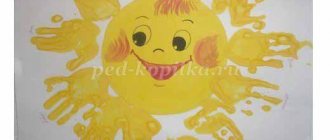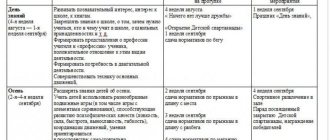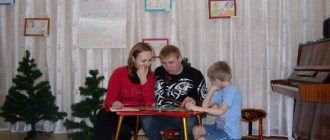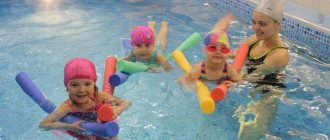Your psychologist. The work of a psychologist at school.
| Topic 2. Family education |
| Topic 3. Family learning |
| Topic 4. Family relationships |
| Topic 5 – 8 |
| Topic 10-15 |
| topic 16-20 |
| Topic 21-25 |
| Topic 26-32 |
| All pages |
Page 1 of 10
Explanatory note Family clubs are created at the place of residence on the basis of secondary schools, institutions of additional education, cultural centers or libraries. Parents with children of different ages, both preschool and school, are invited to participate in the clubs. Club meetings are held, as a rule, once a week, on one of the weekends, somewhere from 14 to 17 hours. During meetings, children participate with their parents in various interesting forms of joint activity: they perform plays, organize concerts, outdoor games, hold various competitions and competitions, read books aloud, watch “cartoons” followed by discussion, have tea parties on birthdays, etc. .d.
Children, participating in the work of the club, learn to play and treat each other and adults in a free environment, not constrained by school discipline. They develop cheerfulness, wit, a desire for independence and creativity, their horizons expand, a correct and optimistic worldview is formed, and the skills of good manners and friendly, benevolent behavior are cultivated. Assistance in decorating premises for family club meetings is provided either from the budget of cultural institutions, or by raising funds from local additional education programs, subject to appropriate agreement between ministries and departments, and local governments. In some cases, if necessary, the parents themselves “reset” in order to successfully carry out this or that event. Experienced specialists - psychologists, family education teachers - can be invited to club meetings on a contract basis, or even “for free” (rarely does anyone refuse, even from the “greats of this world”). In the family club, not only children are brought up, but also the parents themselves acquire the skills and abilities of living in civil society, become active citizens, capable of taking responsibility not only for their home and their family, but also for children from other families, for the development of social -a useful learning and educational environment for all local children, including those from low-income and disadvantaged families. For the first time in the world, city family clubs were organized in Russia, starting in 1906, in Moscow, St. Petersburg, Grodno and Vilna. In Moscow, the club was led by the famous philanthropist Morozova. The club had more than twenty sections and clubs, a library, exhibitions and concerts, and additional classes. The work of the club has largely transformed the cultural life of the capital and influenced the emergence of many other initiatives (read about the Shatskikh colony “Vigorous Life” in Obninsk, the Makarenko colony, the undertakings of Sukhomlinsky, etc.). In Soviet times, family clubs were resumed in 1968 at the Scientific Center for Biological Research of the USSR Academy of Sciences in Pushchino, then in Moscow, Leningrad and many other cities. In total, about 400 family clubs with 1.5 million members operated successfully on the territory of the USSR for many years without a single penny of assistance from the state, which is reflected in numerous publications, films and television shows. In the early 90s, many family clubs disbanded because they could not withstand the general commercialization. However, now favorable conditions for their work have again developed. In addition, today they will, without a doubt, be in demand, since this organizational form of working with children and parents has proven itself in the best possible way. If you go to the Internet and search for information on the words “family + club”, you will get about 1,700 links in Russian alone. There is no need to talk about foreign languages: family clubs have become so organically woven into everyday life in all developed countries that it is already difficult to separate them from all other forms and manifestations of civil society. For example, the local Greek Orthodox Church in the city of Corpus Christi in the state of Texas, USA, is the most family club with all forms of educational and educational work with children and parents, with the celebration of all - including non-religious - holidays and amateur artistic activities. With concerts of classical, folk and jazz music. However, the same thing happened with all the other churches. What about the golf club? What about the archery club? What about a local drama studio, of which there are tens of thousands in the United States? – In fact, all of these are family clubs, where adults and children spend interesting and varied time, relax and educate each other in an artificial, but at the same time in the most natural, environment created by them. Yes, this is the main trend of modern social development in advanced countries: families unite into “balls” of families (in family clubs). From their unification in various types of synchronized activity comes, in many ways, civil society. A family club is the most effective and least financially intensive form of training and educating the younger generation and ensuring a happy family life for tens and hundreds of millions of people in the world. But this whole family-club movement began and developed in Russia. a form of training and education of the younger generation and ensuring a happy family life for tens and hundreds of millions of people in the world. But this whole family-club movement began and developed in Russia. Why do we Russians so easily forget about all our good things and remember only all the worst? In Russia now, this form - one hundred percent public and only zero percent state - is practically not known at all, only because we are accustomed to dancing from the “stove” in everything with the sad and hope-killing name “state.” Unfortunately, the topic “Family Club” is so huge and significant that within the framework of this short text we cannot dwell on it in sufficient detail and refer the reader to specialized literature. Information for the organizer: Contingent: Families in which parents have already realized the need to unite to create - in a generally hostile environment - a favorable artificial-natural environment for supporting the family itself, raising the younger generation and ensuring a happy old age for grandparents. Particularly active in the creation and operation of family clubs are single mothers and fathers, as well as single people and childless families. Street children. Goals and objectives: Creation of an artificial-natural environment that is optimal for organizing a happy family life, raising the younger generation and ensuring a happy old age. Creation and strengthening of civil society. Base of work: Houses of culture, educational and other cultural institutions. Sports, tourism, environmental, fitness and other clubs and public interest groups. Specifics of organization and management: A family club is essentially a public organization. The state - in all its forms - should not interfere, not harm, and only provide the necessary support where and when it is asked for it. A normally functioning family club is a completely self-financing organization. Justification of the main approaches to the selection of content: The family club is a wonderful example of complete self-organization. No one knows better than united parents and children what, where and when to do. Didactics: Firstly, excellent parental natural tact and instinct. Secondly, the enormous experience of the family-club movement accumulated in Russia, the USSR and the world with hundreds and thousands of publications in popular and scientific literature. Annual thematic lesson plan for the Family Club living room (12 hours)
| No. | Subject | Number of hours |
| 1. | Our children | 1 hour |
| 2. | Family education | 1 hour |
| 3. | Family learning | 1 hour |
| 4. | Family relationships | 1 hour |
| 5. | Family and kindergarten | 1 hour |
| 6. | Family and school | 1 hour |
| 7. | Family life | 1 hour |
| 8. | How to organize a family club | 1 hour |
| 9. | Holiday in the family club | 1 hour |
| 10. | How to deal with bad habits | 1 hour |
| 11. | Features of adolescence | 1 hour |
| 12. | Non-standard family | 1 hour |
| 13. | Unusual child | 1 hour |
| 14. | If only I had health, the rest will add up | 1 hour |
| 15. | Raising a patriot of our beloved Motherland | 1 hour |
| 16. | Pedagogical comprehensive education | 1 hour |
| 17. | Every family needs external support | 1 hour |
| 18. | Family reading | 1 hour |
| 19. | Aesthetic and artistic education | 1 hour |
| 20. | The magical world of fairy tales | 1 hour |
| 21. | Family club is a reliable tool in the fight against drug addiction and other bad habits | 1 hour |
| 22. | Socialization in a family club | 1 hour |
| 23. | Environmental education | 1 hour |
| 24. | Intelligence | 1 hour |
| 25. | Native speech | 1 hour |
| 26. | Native ethnicity | 1 hour |
| 27. | Native spirituality and morality | 1 hour |
| 28. | Toys | 1 hour |
| 29. | Inclinations, abilities, talents, geniuses | 1 hour |
| 30. | Educational games | 1 hour |
| 31. | Foreign experience of family education and training | 1 hour |
| 32. | Outlook, worldview | 1 hour |
Previous — Next >>
MAGAZINE Preschooler.RF
Modern approaches to working with parents. Project "Family Club"Project passport Family Club "Sovenok"
“Walking forward along the roads of life, we are always sure of only one thing - there are never too many good friends, with whom you are close day after day...”
At the present stage of education, more and more attention is paid to strengthening cooperation between the parent community and preschool institutions in order to increase the competence of parents in matters of raising and educating children. In our kindergarten, new forms of cooperation are also emerging between the families of pupils and preschool teachers.
- Type of project: educational, musical and creative,
- Educational areas: artistic-aesthetic, social-communicative, speech, physical, cognitive development
- Duration: long term
- Project participants: children of middle preschool age, parents, middle school teachers, music director
The purpose of the family club: Involvement of the family in a single educational space through the interaction of parents and preschool educational institutions; intensifying cooperation between teachers and families of pupils in order to increase the competence of parents in matters of education and upbringing of children.
Tasks:
- increase the level of competence of parents in matters of raising and educating children
- build partnerships between the family and the preschool educational institution
- increase the effectiveness of interaction between parents and teachers
- involve parents in participating in the life of the kindergarten and group
- establish trusting and partnership relationships in the family
- to involve parents in joint activities with children through various types of artistic and aesthetic activities, to introduce them to the cultural wealth of the Russian people
- to form moral and patriotic feelings in children
- develop a friendly attitude towards each other
- to cultivate in children interest and love for Russian and Komi culture through various types of folklore (fairy tales, proverbs, riddles, round dances, songs, theater)
Club directions:
- Educational (educational and informational)
- Leisure
Relevance
- One of the problems in modern society is the destruction of the traditional foundations of the family, the traditional understanding of the family is being lost, which is connected not only by blood ties, but also by common events of family life and spiritual interests
- The tendency of many parents to withdraw themselves from addressing issues of child upbringing and personal development has intensified. This can happen due to employment, overload with everyday problems, loss of moral guidelines, and often the inability and unwillingness to work with children. As a result, children are deprived of active participation and support from loved ones. Emotional coldness in the family affects the psychological development of the child and, above all, the development of his creative abilities.
- There is a lack of information among parents regarding the upbringing and education of children.
Project implementation plan Family Club "Sovenok"
Preparatory stage
Conversations with teachers and parents, discussion of project directions, selection of literature, drawing up a project implementation plan, development of long-term planning of project activities.
Main stage
A series of events on various topics, preparation of joint creative performances, design of artistic exhibitions, consultations for preschool teachers and parents on project topics.
The final stage
Presentation of the project Family Club "Owlet" . Conducting the final event, presenting certificates and prizes, drinking tea.
Forms of work on the project
- placement of information and pedagogical materials on the “Music Corner” and on information stands in reception areas
- survey
- speeches at parent meetings
- joint child-parent creativity
- Parents attending music lessons at their request
- individual consultations
- participation of parents in the preparation and conduct of holidays and entertainment
- participation of parents in competitions and exhibitions on various project topics
Intended project products
- Conducting surveys, collecting parent feedback
- A series of events on project topics
- Family art exhibitions
- Joint musical and theatrical creativity of children and parents
- Photo exhibitions of events
- Final events on project topics
Family club work plan
| Name events | the date of the | Working with parents | Responsible | |
| 1 | “We really love to play” | november | Information stand “Game activities in kindergarten” Thematic booklets-memos. Joint play activities of parents and children at the holiday “We really love to play” Information report on the topic: “Game is the main activity of preschoolers.” Presentation on this topic. Involving parents in creating attributes for the event (horses) | Musical Director, educators |
| 2 | "We're playing theater" | January | Poster information. Introducing children and parents to different types of theater. Joint theatrical creativity of children and parents. Participation of parents in the theatricalization of the fairy tale “Teremok”. Theatricalization of the musical fairy tale “Kolobok” (children). Showing theatrical fairy tales to children (theatrical fairy tales, theatrical nursery rhymes, dialogues) using different types of theaters (finger theater, table theater, spoon theater). Celebration “Playing a Fairy Tale” with the participation of children and parents. Involving parents in sewing costumes and making attributes, making different types of theater. | Musical Director, educators |
| 3 | “Artistic and aesthetic creativity” - folk crafts, Russian folk games | March, April | Information stand. Educational information for parents on the topic. Crafts "applied arts" Exhibition of crafts “Folk Crafts” Joint child-parent creativity Holiday “Visiting Matryoshka” with the participation of parents and children. | Musical Director, educators |
| 4 | “We are growing healthy” | May | Stand information Familiarization of parents with a set of activities aimed at improving the health of pupils. Booklets-memos. Master class for parents on the topic “Health-saving technologies in kindergarten” (articulation, breathing exercises, hardening, playful self-massage techniques, coordination and movement games, physical exercises, etc.) Sports events: “Merry Starts”, “Merry Tourists” (joint trip to the forest) | Musical Director, educators |
Expected Result
-Involvement of families in a single educational space through interaction between parents and preschool educational institutions;
-intensifying cooperation between teachers and students’ families
-increasing the competence of parents in matters of education and upbringing of children
- bringing parents closer to their children, enriching the relationship between them through emotional communication, the emergence of their need for family joint creativity. - active participation of parents in the life of the preschool educational institution, in holding children's parties, competitions and other events
| < Previous | Next > |
Pedagogical project Family Club “If you want to be healthy”
PEDAGOGICAL PROJECT
“FAMILY CLUB “IF YOU WANT TO BE HEALTHY””
Project type:
pedagogical, practice-oriented;
Project participants:
preschool teachers, parents of students.
Duration:
long-term.
Implementation deadlines
: September – May.
Implementation environment:
developing subject-spatial environment of preschool educational institutions.
Problem:
interaction between parents and teachers, focused on preserving and strengthening the health of preschool children and their physical development.
Target:
to involve parents in a single health space aimed at preserving and strengthening the health of preschool children and their physical development.
Tasks:
increase the competence of parents in matters of protecting and promoting the health of children;
provide psychological and pedagogical support to families involved in sports and the physical development of children;
study the dynamics of physical development of pupils;
to educate, together with parents, the need for preschoolers to have a healthy lifestyle;
develop initiative and an active position in preschoolers and their parents;
provide methodological assistance in preparing and conducting physical education events;
create conditions for parents to communicate with each other and their children;
promote mutual understanding between participants in educational relations;
summarize and present the experience of families on the physical development of children at conferences and in the media.
Relevance:
Large-scale transformations in society, the introduction of the Federal State Educational Standard for preschool education, the complex socio-economic and environmental conditions of our time dictate the need to search and develop new approaches to the implementation of the tasks of educational work in preschool educational institutions. According to the Concept of Modernization of Russian Education, the family should be an active subject of educational policy. Achieving the strategic goals of modernizing education is possible only in the process of constant interaction of the educational system with various representatives, including the family as a social institution.
Strengthening the educational and educational function of a preschool institution, as well as changes occurring in the life of society, necessitate improving the forms and methods of interaction between kindergarten and family, teachers and parents. The development of the child depends on the joint work of parents and teachers. And it is the quality of work of a preschool institution that determines the level of pedagogical culture of parents, and, consequently, the level of family education of children.
Family upbringing has always played a decisive role in the development of a child’s personality. Just like every family, a preschool institution has an established system of values and traditions. Sometimes they not only do not coincide, but are completely opposite to them. Their educational functions are different, but for the comprehensive development of the child their interaction is necessary. In this regard, there is an urgent need to establish close contact between the kindergarten and the family.





